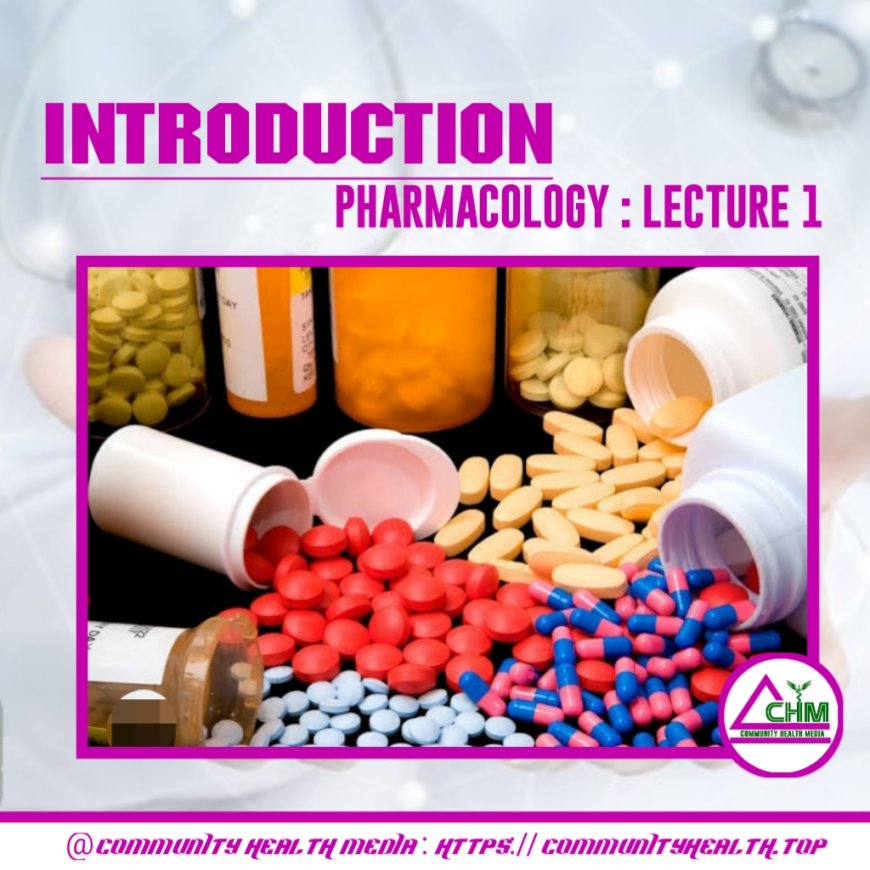Introduction to pharmacology

Welcome to our online Lecture on Introduction to Pharmacology!
Pharmacology is a fascinating and essential subject that plays a critical role in modern healthcare. From understanding the mechanisms of action of drugs, to the practical applications of pharmacology in the treatment of medical conditions, this course is designed to provide you with a solid foundation in the subject.
In this course, you will learn about the different drug classifications, routes of administration, and the principles of pharmacokinetics and pharmacodynamics. You will also explore the importance of medication safety, adverse drug reactions and drug regulation, and the role of essential drugs in the management of medical conditions.
We understand that pharmacology can be a complex and challenging subject. However, we have designed this course to be engaging and accessible to students of all backgrounds and levels of experience. Our expert instructors will guide you through the course material, using a combination of lectures, case studies, and interactive exercises to ensure that you have a comprehensive understanding of the subject.
By the end of this course, you will have a solid foundation in pharmacology, which will enable you to understand the different drug treatments available and their appropriate use in various medical conditions. You will also have the skills and knowledge required to ensure medication safety and rational drug use.
Introduction to Pharmacology: Understanding the Basic
Pharmacology is a field of study that focuses on the effects of drugs on living organisms. It encompasses the study of the therapeutic and toxicological effects of drugs, the sources of drugs, their chemical properties, and their metabolism within the body. Understanding pharmacology is essential for healthcare professionals, as it helps in making informed decisions regarding the use of drugs for the prevention and treatment of diseases.
Definition of Pharmacology
Pharmacology is the study of drugs and their effects on living organisms. The term pharmacology is derived from two Greek words: pharmakon meaning drug, and logos meaning study. Pharmacology involves the study of drugs in terms of their source, chemical composition, action, and effects on the body.
Importance of Pharmacology in Healthcare
Pharmacology plays a vital role in healthcare, as it helps in the development of new drugs, the testing of drugs for their efficacy and safety, and the appropriate use of drugs for the prevention and treatment of diseases. Healthcare professionals such as doctors, nurses, and pharmacists must have a sound knowledge of pharmacology to make informed decisions regarding the use of drugs in their patients.
Scope and Branches of Pharmacology
Pharmacology has a vast scope, covering a wide range of topics such as drug discovery, drug development, drug delivery, and drug therapy. It also includes the study of drugs' interactions with the body, such as pharmacodynamics and pharmacokinetics. The branches of pharmacology include clinical pharmacology, toxicology, pharmacogenetics, and pharmacoeconomics.
Drug Nomenclature and Classification
To study drugs in-depth, it is necessary to understand drug nomenclature and classification.
Definition of Drugs
Drugs are defined as any substance or mixture of substances used to treat, diagnose, or prevent diseases. Drugs can be classified as prescription drugs or over-the-counter drugs.
Principles of Drug Nomenclature
The naming of drugs follows certain principles that enable the identification of the drug's chemical structure and properties. The International Nonproprietary Name (INN) is a standardized name given to drugs by the World Health Organization (WHO). It provides a common name for drugs that can be understood worldwide.
Classification of Drugs Based on Their Effects on the Body
Drugs can be classified based on their effects on the body, such as the therapeutic or pharmacological action of the drug. This classification includes drugs used to treat specific diseases, such as antibiotics, antivirals, and antidiabetic drugs.
Classification of Drugs Based on Their Chemical Structure
Drugs can also be classified based on their chemical structure. This classification includes drugs such as opioids, benzodiazepines, and statins. Understanding the chemical structure of drugs is essential as it provides insight into the drug's potential actions and side effects.
Conclusion
In conclusion, understanding pharmacology is essential for healthcare professionals, as it helps in making informed decisions regarding the use of drugs for the prevention and treatment of diseases. Drug nomenclature and classification are fundamental concepts in pharmacology that provide a systematic and standardized approach to drug identification and study. By understanding these concepts, healthcare professionals can optimize patient outcomes and improve healthcare quality.


